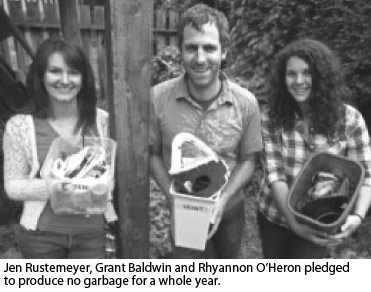A year without garbage

Think about your last trip to the grocery store. You probably needed a few fruits or vegetables, so you grabbed a couple of those thin plastic bags to put them in. Making your way to the bakery, you grabbed some bread and maybe some cookies or cupcakes for a treat. Time to head down the snack aisle — shove some chips and salsa, pretzels and popcorn into your cart. At the checkout, you've got to buy a few of those 5¢ bags to put all your delicious groceries in.
Think about all the garbage this single trip to the grocery store just created. From those little bags for your produce to the packaging that kept your cookies fresh, there's a lot that will end up in a landfill.
Now think about what you would do if you imposed a rule on yourself that you couldn't produce any garbage for a whole year.
That's what Grant Baldwin, Jen Rustemeyer and Rhyannon O'Heron did in 2008. Beginning on July 1, they pledged to buy no more "stuff" and produce zero landfill waste for an entire year.
The idea came after Baldwin and Rustemeyer took a cycling trip along the Pacific Coast of the United States. "After months of carrying everything we needed on our bicycles, we thought, 'We have too much stuff,'" explained Rustemeyer on the project's blog. "In fact there was an entire house filled with all sorts of things that we hadn't missed at all while we were away."
After returning home to Vancouver, B.C., the couple discussed how they had noticed overpackaging of products from food to electronics. "We were talking about sustainability a lot, but hadn't changed a lot in our own lives," added Rustemeyer. They decided to take one step to make a change, and reducing the amount of garbage they produced seemed like a smart choice.
The couple were living with O'Heron at the time. According to O'Heron, it didn't take a lot of convincing to get her involved with the project. "They were talking about it, and to me it was a no-brainer. I wasn't going to live there while they were doing this challenge and be a huge consumer," she laughed. "It seemed like a good idea, and I might as well participate and try."
Rustemeyer documented the friends' no-waste year with a blog, which can be read at cleanbinproject.com. Baldwin filmed the project through the year, ultimately producing The Clean Bin Project documentary.
For a little extra motivation, the friends decided to add an element of friendly competition: a contest to see who could produce the least amount of garbage in an entire year.
At the end of the year, they threw a weigh-in party with family and friends. Though they would not reveal who the actual winner of the project was — this is revealed in the documentary — Rustemeyer did say that they were very pleased with the results.
"The average person produces 750 pounds of garbage in one year; across the board, we were all very close to four pounds," she said. "It was a significant reduction for just a few lifestyle changes. I feel like that's the level that's really doable."
Though such extreme waste reduction was doable, it certainly wasn't easy.
"Definitely for me it was (tough), because I love my toys, especially electronics," explained Baldwin. "You'd think after doing a project like this, it would change you, but I still love all that stuff."
O'Heron said the most difficult part for her was not accepting gifts from family and friends — one of the rules outlined by the project. "We had just kind of agreed as part of the rules that because we weren't buying anything, that we wouldn't accept gifts, either," she said. Instead, the trio gave and asked for "experience" gifts, such as pedicures or movie tickets, or homemade gifts like baked goods.
One of the challenges Rustemeyer said she faced was with groceries. "It all became about food packaging. We started buying much less cheese," much to this fromage-loving group's dismay.
To avoid excess packaging, the trio made some changes in the way they shopped for groceries, including bringing reusable bags and reusable plastic containers for deli goods. They also washed out the plastic bulk and produce bags they already had, so they could re-use them.
They also made an effort to visit local farmers markets. "We were really lucky," said O'Heron. "Pretty much everything you can get (at the farmers market) is not packaged or it's recyclable."
"We spent more on experiences and quality food, but those things enhanced our lives," Rustemeyer said, adding, "there were thousands of dollars that we saved, just from not buying clothing and electronics."
For those looking to cut down on their own waste, Rustemeyer said that it is best to start small. "Pick one thing first and do it until it becomes a habit, then move onto the next thing." She suggested starting with composting. "That's 30 to 50 per cent of your waste. If everybody composted, we'd have half the amount of waste in our landfills."
The group wanted to show others that making these lifestyle changes isn't hard, and used the blog and documentary to do so. The documentary really inspires people to reduce their waste, said Baldwin. Last year, he showed the film in various cities across Canada, and "some of the places we went to even started their own clean bin projects," he said proudly.
"After our cross-Canada tour, we started entering film festivals," he continued, saying that the film was very well received. The film's U.S. premiere took place at the end of March.
Baldwin is aiming to have the film available for download or purchase online in the fall. A preview for the film can be watched at cleanbinmovie.com.













